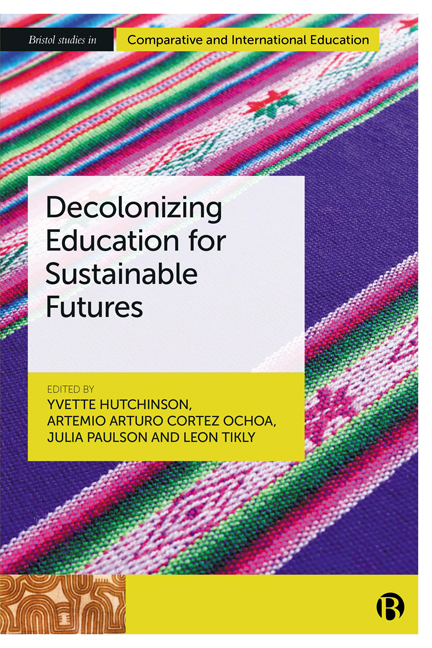Book contents
- Frontmatter
- Contents
- Series Editor Preface
- List of Figures and Table
- List of Abbreviations
- Notes on Contributors
- Acknowledgements
- Introduction
- PART I Connecting Decolonial and Sustainable Futures in Education
- PART II Decolonizing Education for Sustainable Futures: From Theory to Practice
- PART III Education’s Reparative Possibilities: Responsibilities and Reckonings for Sustainable Futures
- Conclusion
- Afterword
- Index
Conclusion
Published online by Cambridge University Press: 18 January 2024
- Frontmatter
- Contents
- Series Editor Preface
- List of Figures and Table
- List of Abbreviations
- Notes on Contributors
- Acknowledgements
- Introduction
- PART I Connecting Decolonial and Sustainable Futures in Education
- PART II Decolonizing Education for Sustainable Futures: From Theory to Practice
- PART III Education’s Reparative Possibilities: Responsibilities and Reckonings for Sustainable Futures
- Conclusion
- Afterword
- Index
Summary
Decolonizing Education for Sustainable Futures has explored connections between the two necessary processes within its title. Its key argument is that for future-making projects to be sustainable and to address the enormous planetary challenges facing human beings and natural ecosystems, certain approaches need to be in place. Future-making projects must be oriented towards justice. Therefore, they must seek to undo and transform the systemic and structural injustices of the past whose afterlives shape the present and will endure into the future if not confronted and repaired. In other words, they must contribute towards what Swilling (2020) describes as ‘just transitions’ (Chapter 1). The book reflects upon the UNESCO Futures of Education report, with its call for a new social contract for education. It builds from three online seminars hosted by the Bristol Conversations in Education series in 2020, at which many of the chapters presented here were first shared. The questions that guided the seminar series and the report published afterwards (Cortez Ochoa et al, 2021) have also animated this volume.
To conclude the volume, we reflect back on these questions, offering some tentative responses that emerge from its chapters. We hope that these might encourage conversation and build on practice about the necessary relationships between sustainable futures, decolonization and repair.
What is the relationship between sustainable futures and demands to decolonize education?
How are agendas for decolonizing education and sustainable futures connected?
The connection between sustainable futures and demands to decolonize education is at the heart of this book's challenge. It argues that sustainable futures cannot be imagined or achieved without addressing the demands for decolonization. This core argument is developed in different ways across the book, including in Chapter 1, where Leon Tikly examines five narratives of sustainable futures and, crucially, considers the extent to which those narratives respond to the challenges of rights, social justice, environmental and decolonial priorities. Referring to the scholarship of de Sousa Santos (2017), Tikly outlines the need for a ‘pluriversality’ based on a recognition of multiple ways of ‘knowing’ the world that can contribute to social and environmental justice. The processes of validating knowledge systems and the ways in which those knowledge domains are used politically is further explored in Catherine A. Odora Hoppers’ chapter on knowledge production.
- Type
- Chapter
- Information
- Decolonizing Education for Sustainable Futures , pp. 241 - 249Publisher: Bristol University PressPrint publication year: 2023

